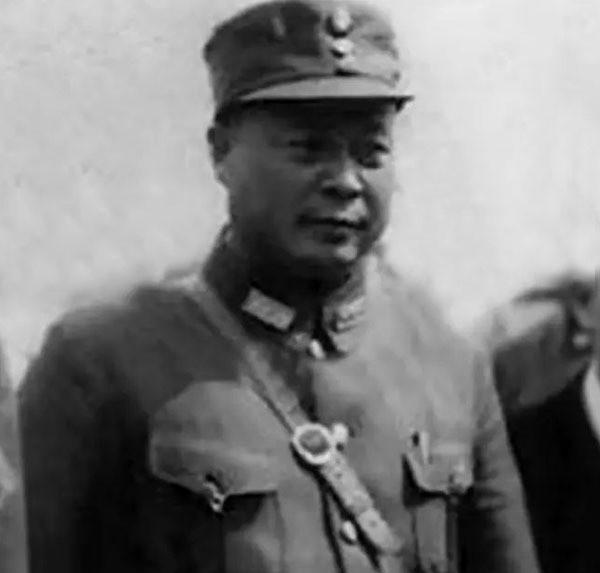What is history: it is the echo of the past to the future, the reflection of the future on the past. - Hugo
The National Revolutionary Army led by Chiang Kai-shek suffered successive defeats on the battlefield and Chiang Kai-shek himself lost the hearts and minds of the people, and the phenomenon of the revolt of the generals of the Nationalist army appeared. However, among the generals of the uprising, there was one rebel general, who, after submitting to our army, was the first to take the lead in capturing Chiang Kai-shek's presidential palace during the liberation of Nanjing, and planted a red flag with a five-pointed star on the top floor of the presidential palace.
This legendary rebel general is Wu Huawen, who is also a more complex figure, and to put it ugly, it is a wall head grass. Why? This has to start with his life experience.

Wu Huawen
Wu Huawen, a native of Ye County, Shandong Province, was born into a poor family, and his family conditions were not very wealthy. Therefore, Wu Huawen dropped out of private school after a few years of private school, and then he mixed up in society. However, when he was 18 years old, Wu Huawen joined the Northwest Army led by Feng Yuxiang at that time, and was a small soldier under Han Fuqu. You must know that eating military food in a chaotic world is also very popular, after all, at that time, it was the world where having a gun in your hand was the king's way.
Wu Huawen in the Northwest Army stood out in the Northwest Army because of his bravery in battle, and was admired by his superior Han Fuqu and was promoted to the head of the teaching regiment. Later, after Han Fuqu defected to Chiang Kai-shek, Wu Huawen joined the Nationalist army group in this way. Can it be said that things are clustered? Because during the War of Resistance Against Japanese Aggression, Han Fuqu voluntarily abandoned Shandong because he did not resist and was shot by Chiang Kai-shek. As a miscellaneous general, Wu Huawen eventually defected to the Wang puppet regime and became a traitor.
Wang Yaowu
During these eight years of the War of Resistance Against Japanese Aggression, Wu Huawen was very desperate, and was once ordered to implement the Three Lights Policy proposed by the Japanese in the Lunan region of Shandong. He caused great losses to the people of Lunan area and was a notorious traitor. However, such a figure was driven and incorporated by Chiang Kai-shek after the victory of the War of Resistance. Wu Huawen's headquarters was expanded into the 96th Army, with Wu Huawen as its commander, and the army came under the jurisdiction of Wang Yaowu, commander of the Second Appeasement District. At the same time, Chiang Kai-shek also planted a time bomb for himself. Of course, this bomb refers to Wu Huawen.
In September 1948, the East China Field Army decided to liberate Jinan, an important town in Shandong. The commander of the Jinan garrison is Wang Yaowu, a famous general during the War of Resistance Against Japanese Aggression, and I believe that everyone knows this well, and is definitely a fierce general in the camp of the Nationalist Army. In addition, Jinan is also a city with thick walls, and the number of officers and men defending the city has reached 120,000, which has brought great difficulties to the East China Field Army that liberated Jinan. In order to reduce unnecessary casualties and strive to liberate Jinan as soon as possible, comrade Dongdong of our party locked Wu Huawen in and decided to plot against him, after all, Wu Huawen people belong to those who are not firm in their beliefs and are easy to be rebelled against.
Rebel soldiers
When the East China Field Army was approaching the city, and underground comrades were doing ideological work, Wu Huawen finally led more than 20,000 people to declare an uprising on the evening of October 19. His uprising enabled the East China Field Army to successfully invade the city of Jinan from the western front of Jinan and successfully liberate Jinan. After that, the troops of the uprising were reorganized into the 35th Army, and Wu Huawen was still the commander.
Then, after our army launched the Campaign to Cross the River, the Second Field Army and the Third Field Army successfully broke through the Yangtze River defense line, crossed the Yangtze River, and liberated Shanghai, Nanjing and other cities. Then, during the liberation of Nanjing, the first to capture Chiang Kai-shek's presidential palace was the 35th Army of the rebel general Wu Huawen. Therefore, Wu Huawen also made great contributions to the liberation of Jinan, Nanjing and other cities. So after the founding of the People's Republic of China, as the first rebel general to capture the presidential palace, how did Wu Huawen live later?
Presidential palace
After the liberation war was completely over, Wu Huawen's 35th Army was withdrawn. In recognition of his contribution to the Revolutionary War, he was awarded the Order of Liberation, First Class, in 1955. After that, he served as the director of the Hangzhou Transportation Department. From 1959 to 1962, he was vice chairman of the Zhejiang CppcC National Committee and a member of the National Committee of the Chinese People's Political Consultative Conference. He died in Shanghai in April 1962 at the age of 58.